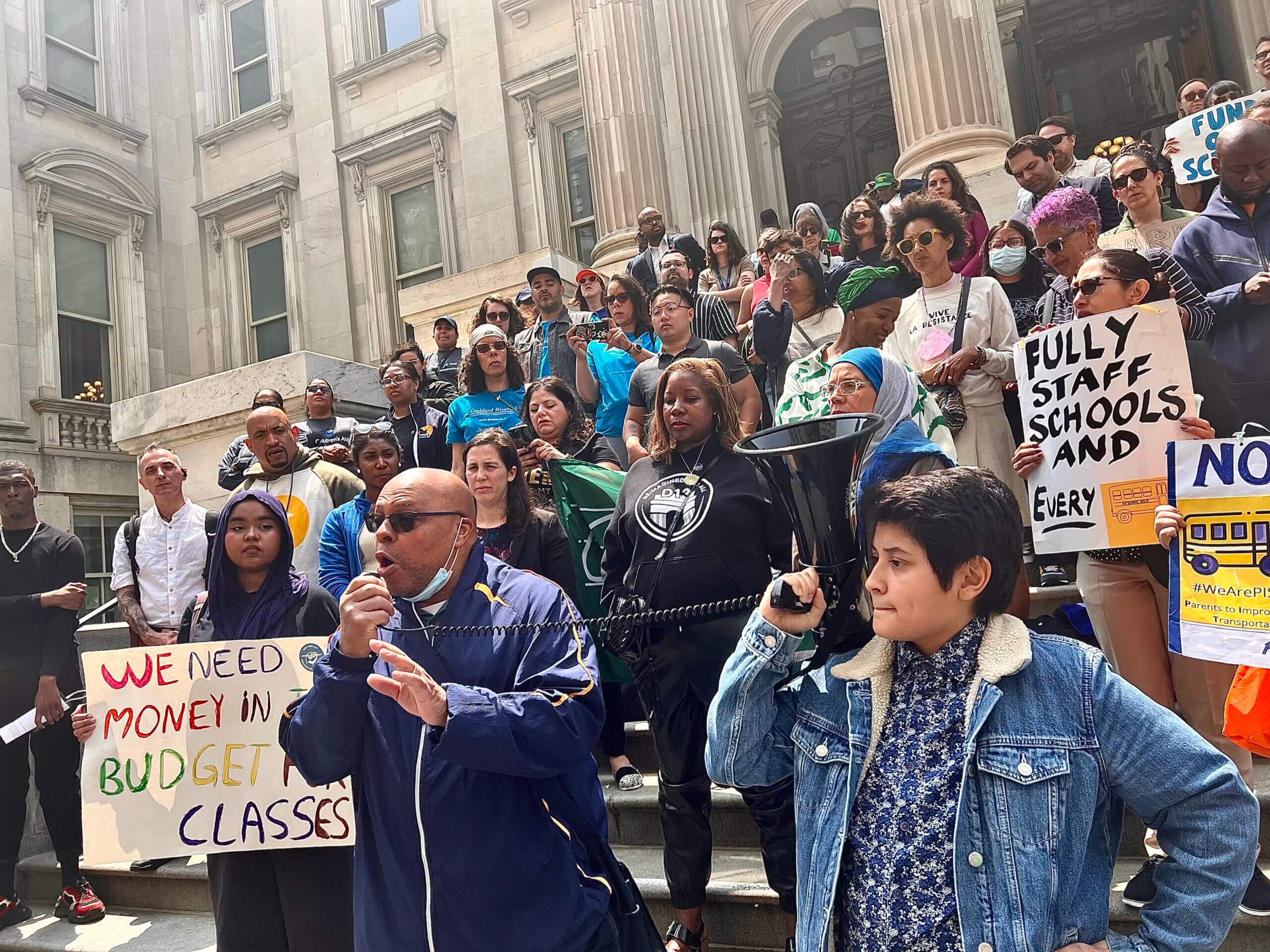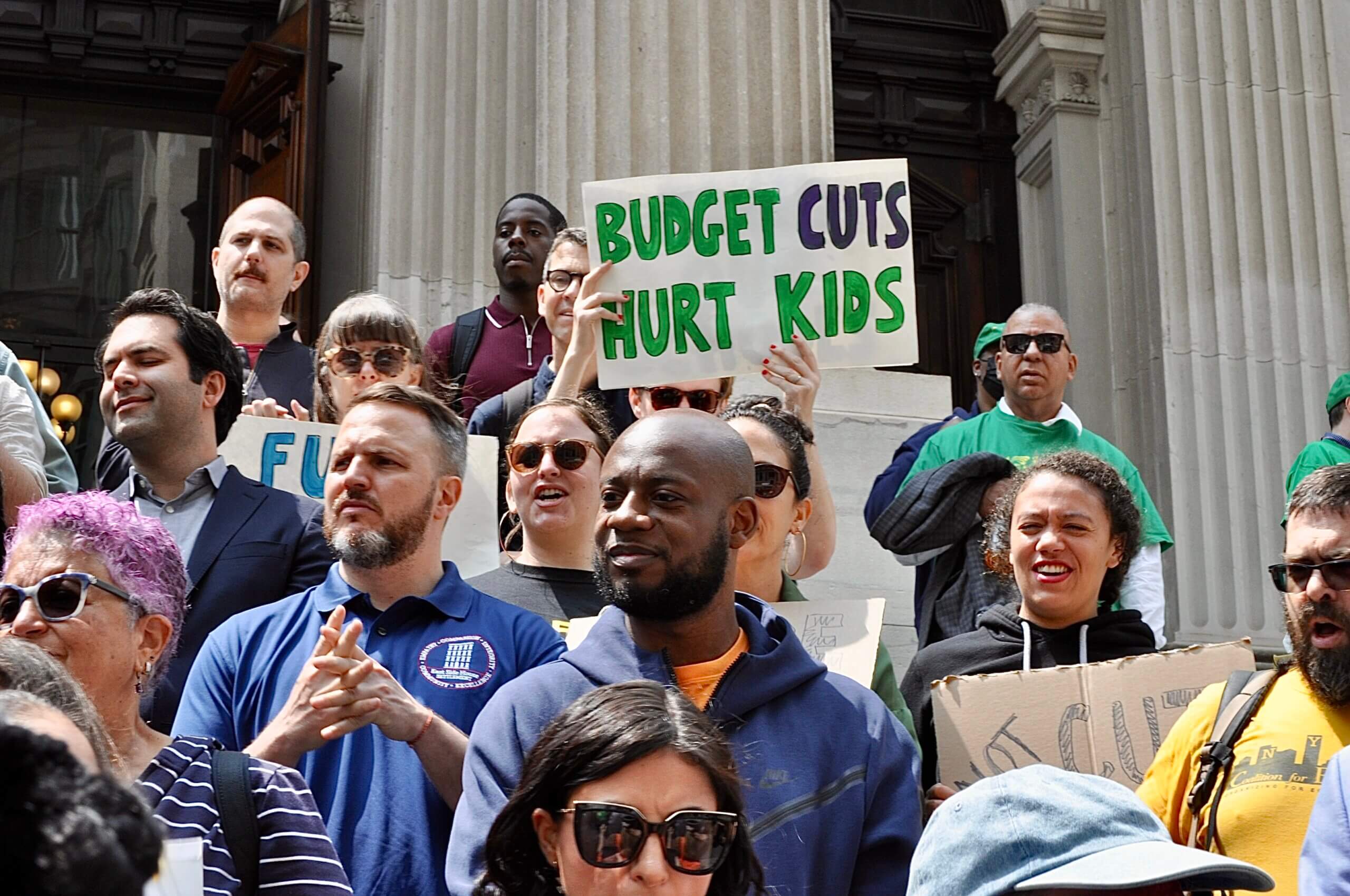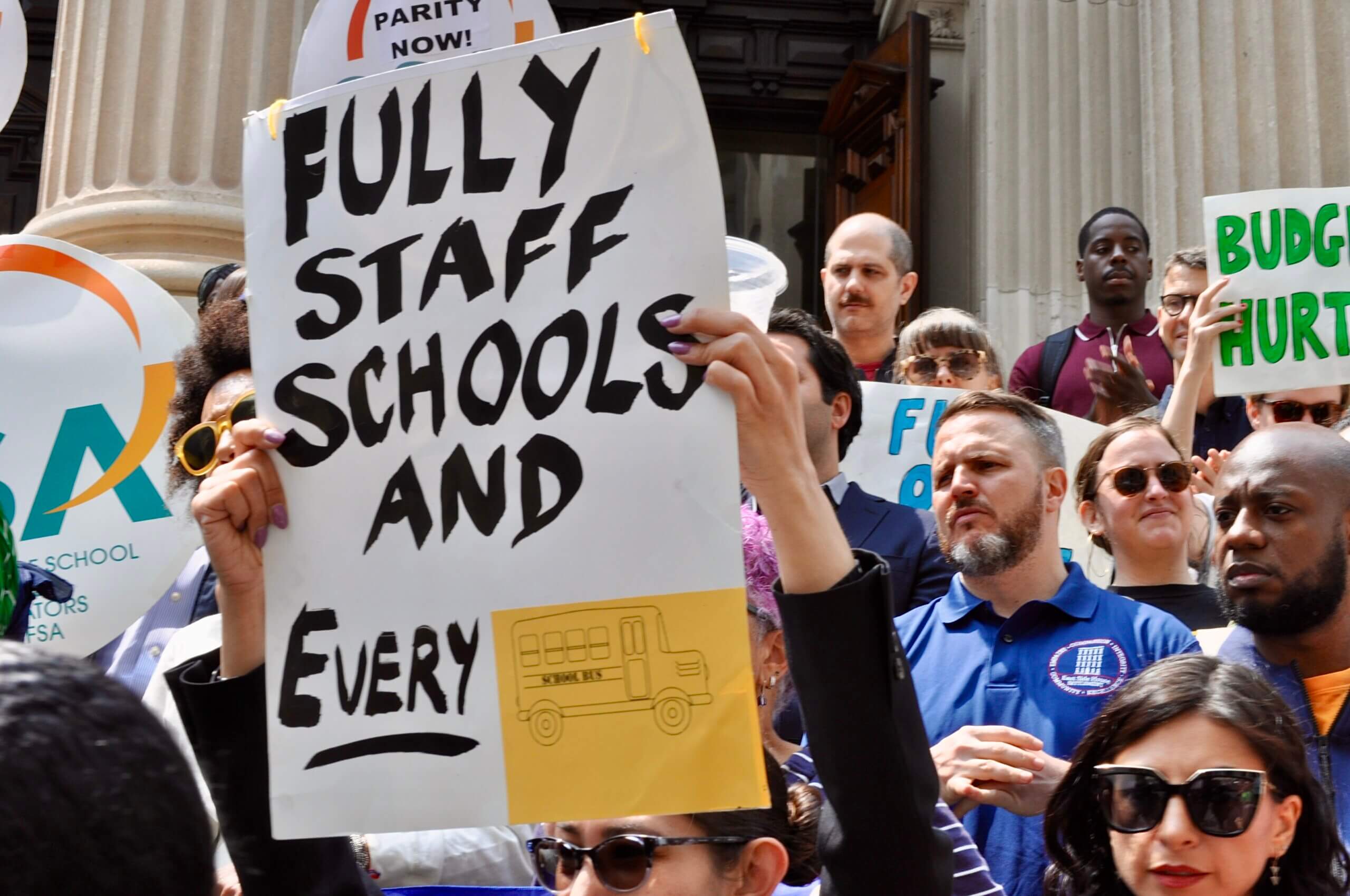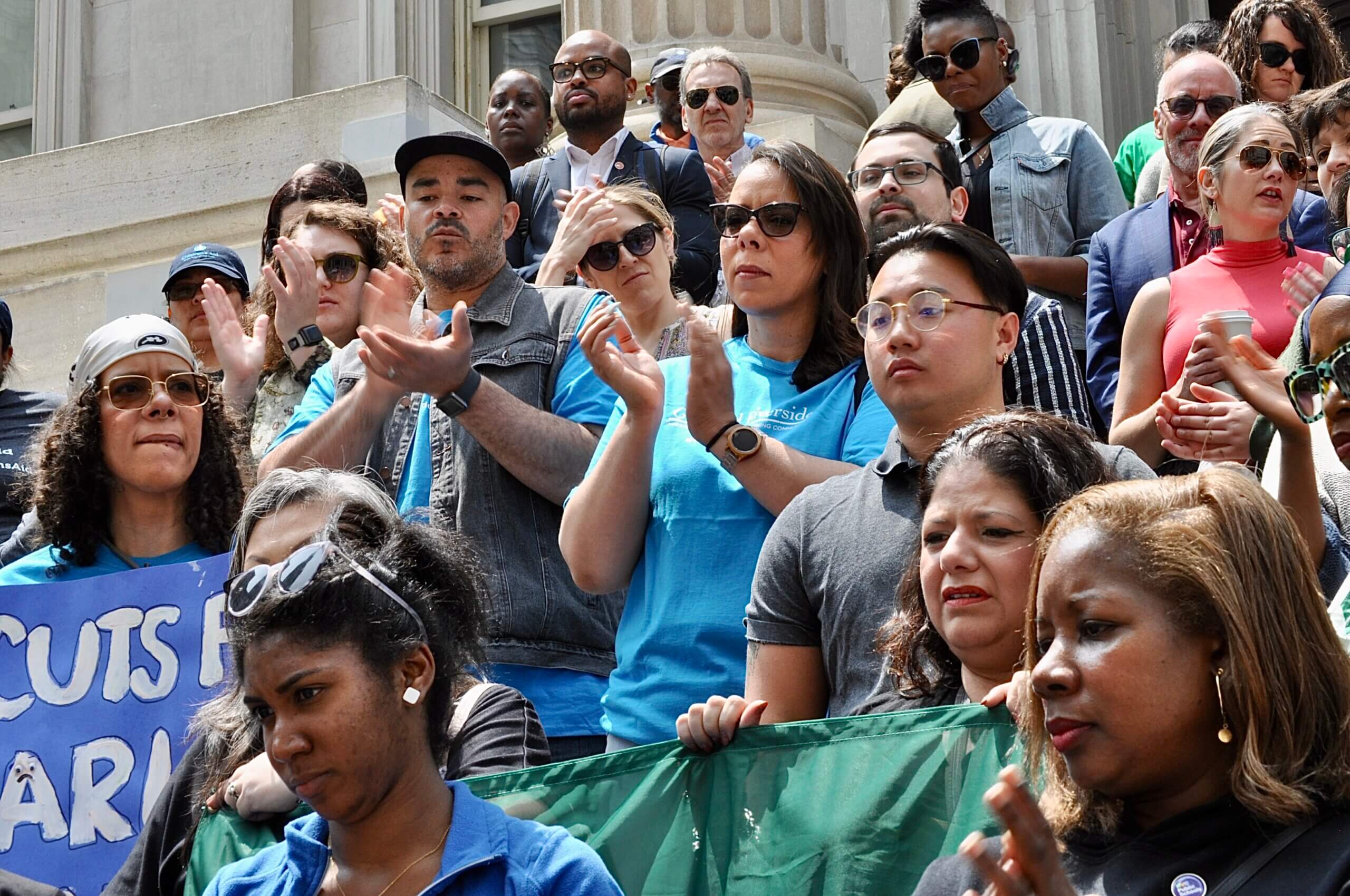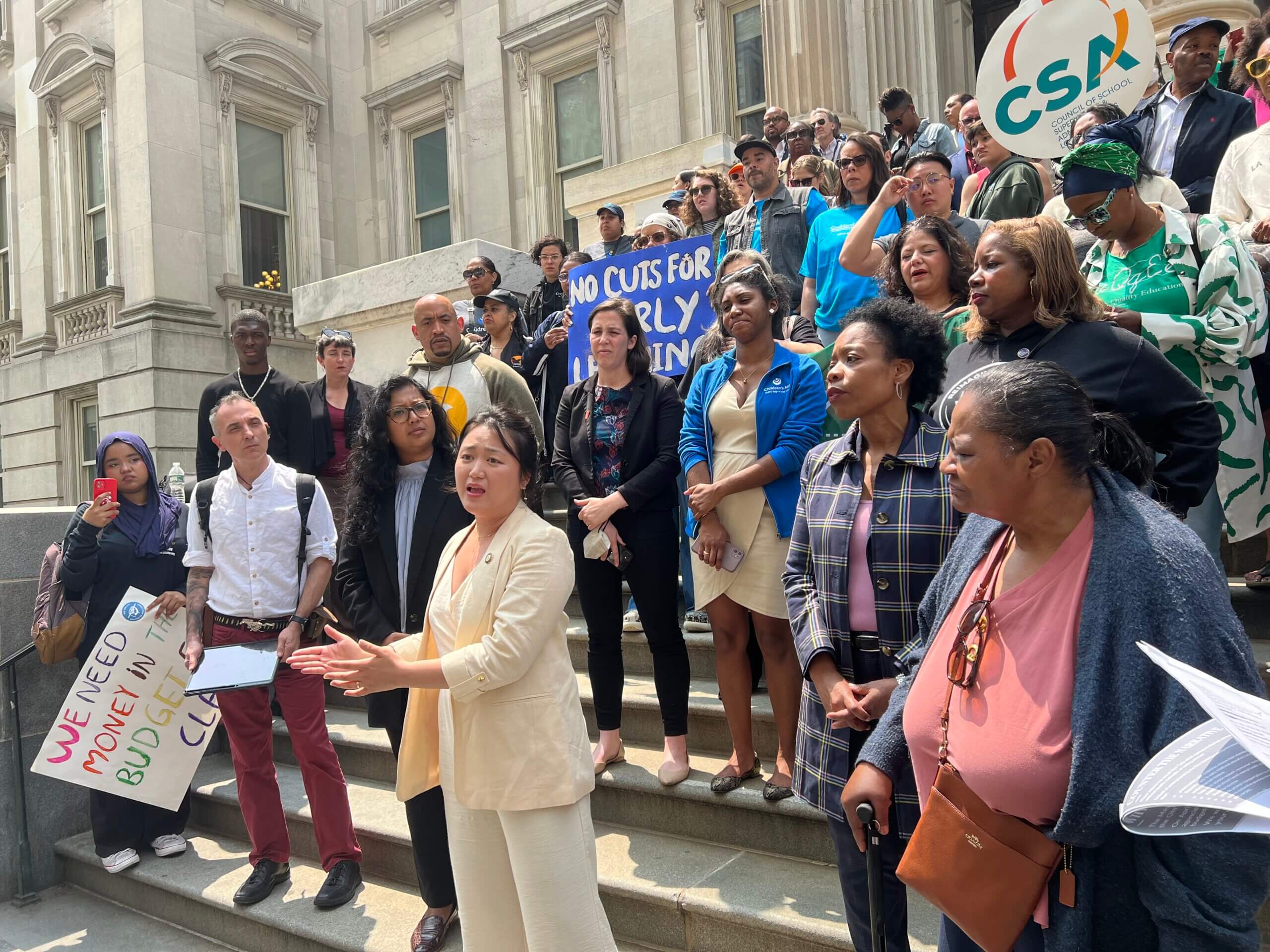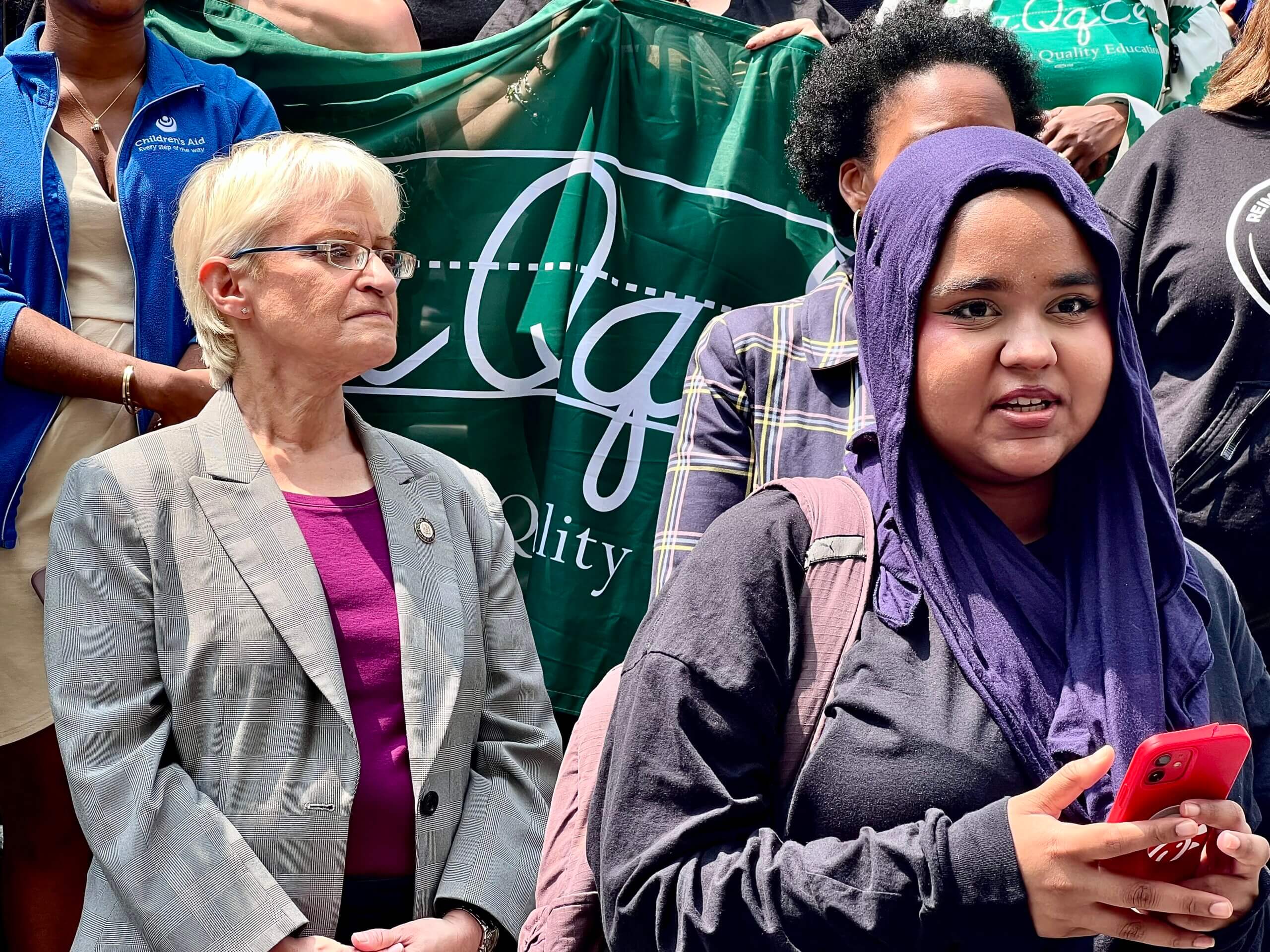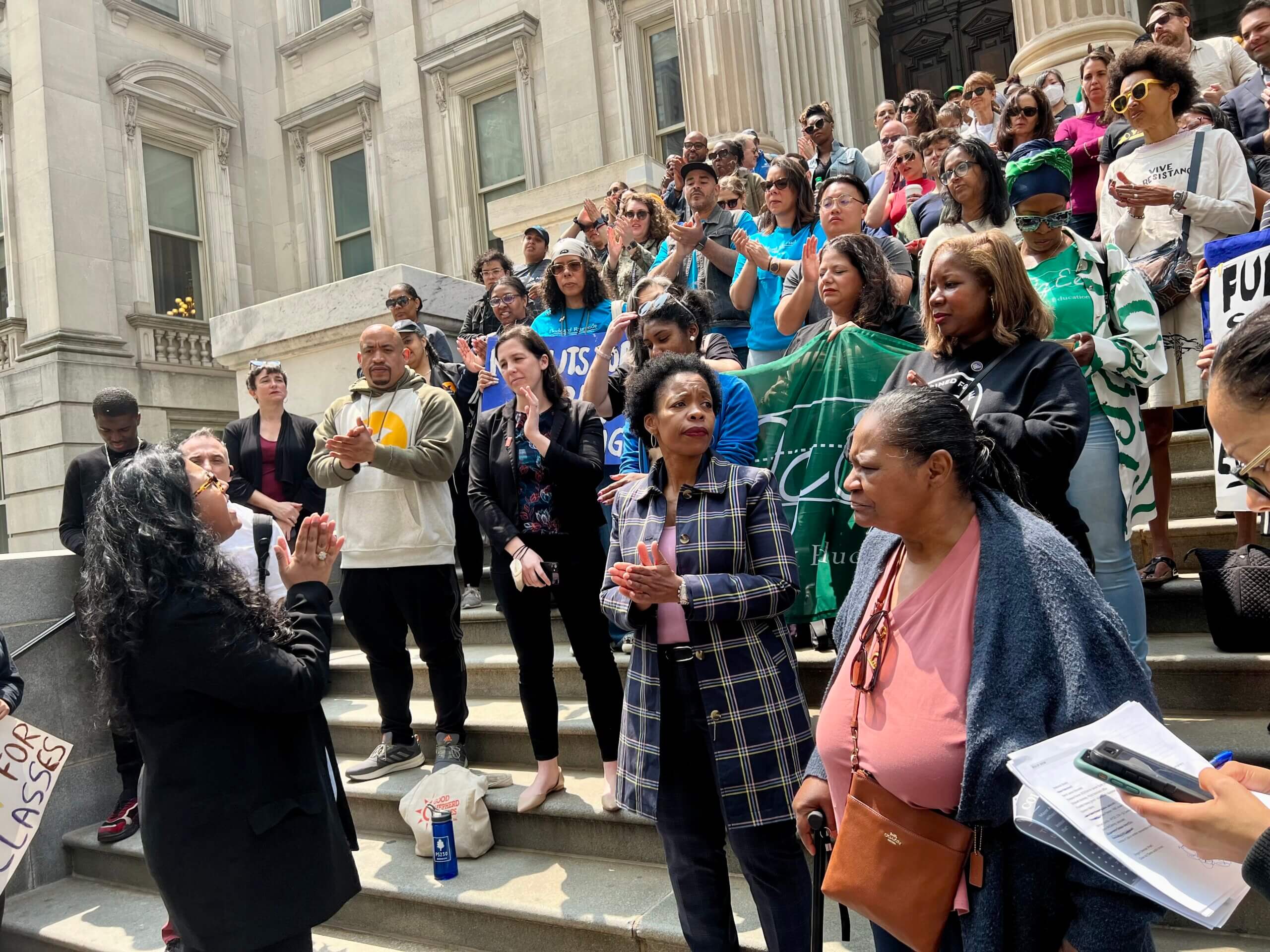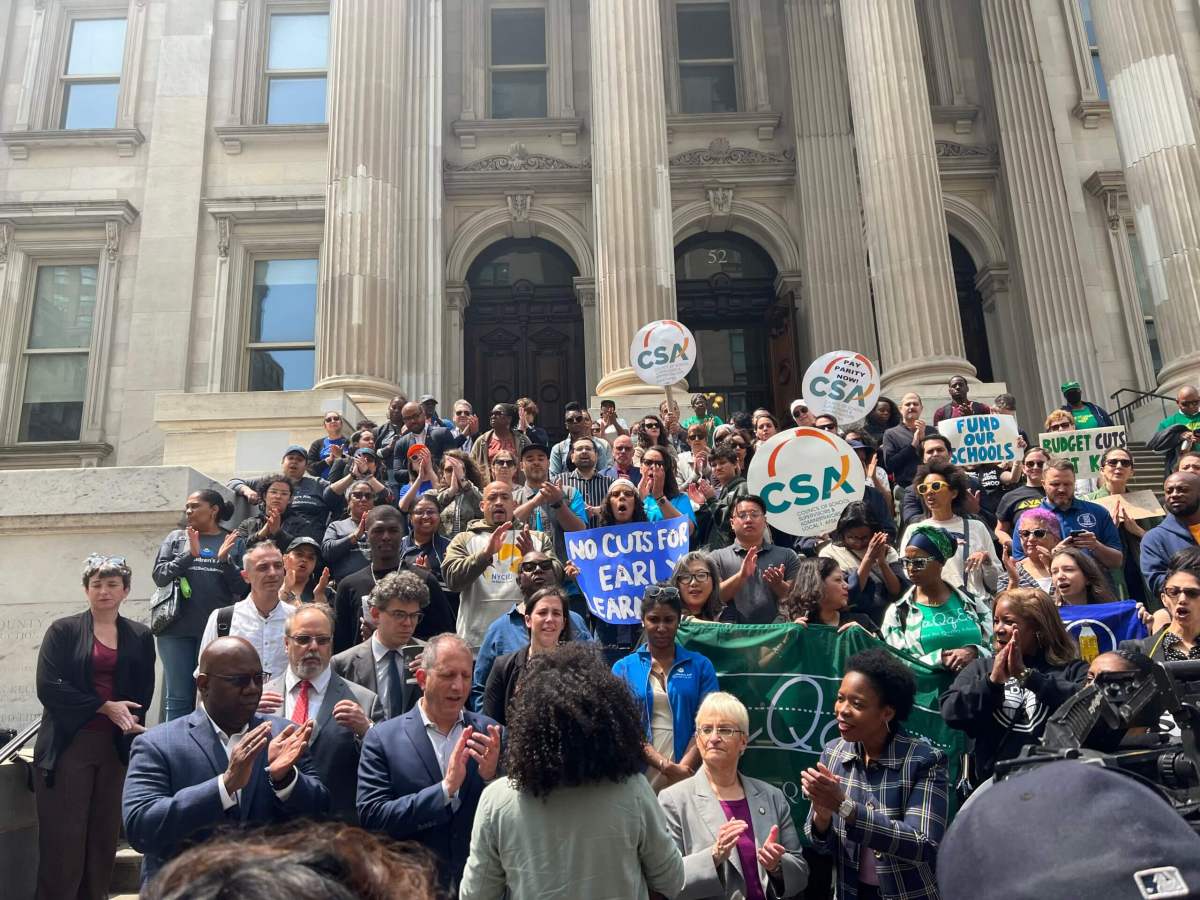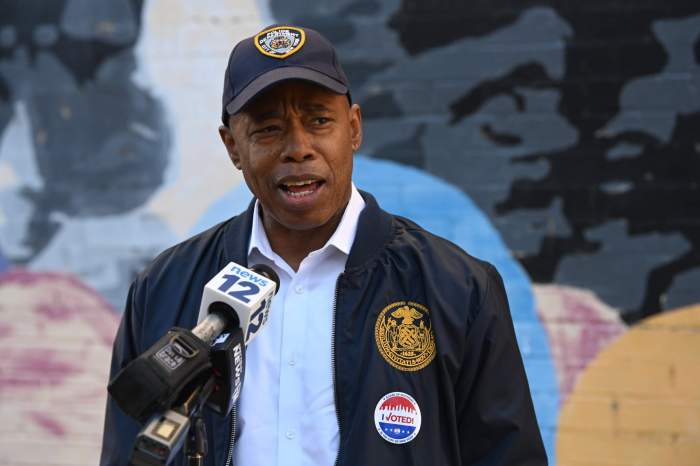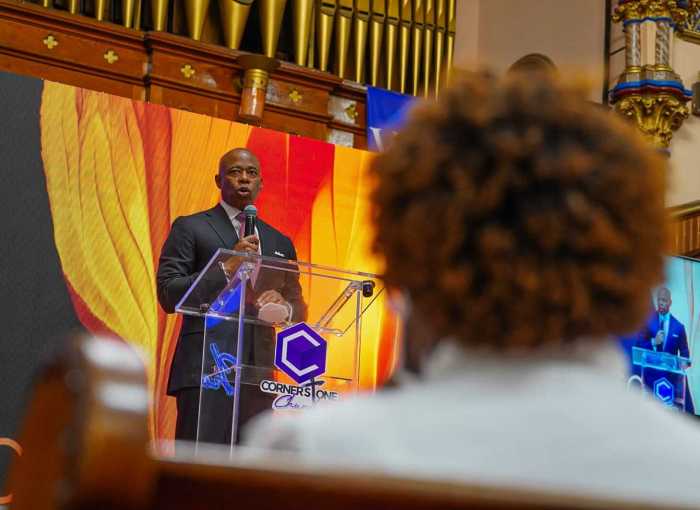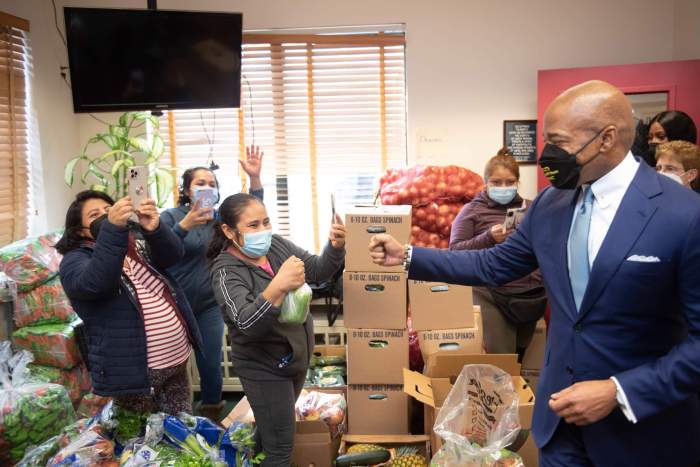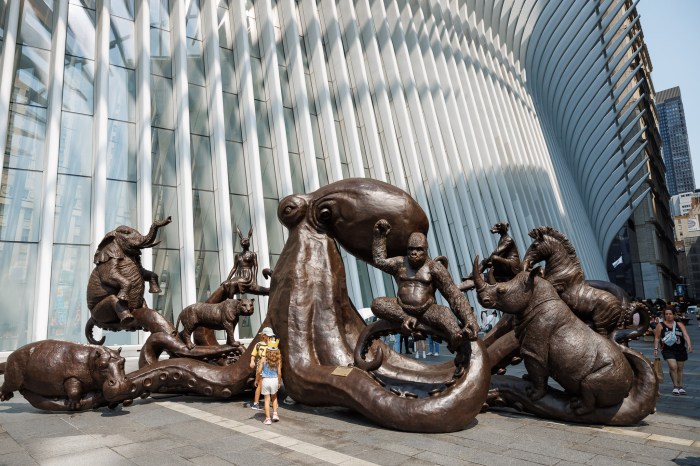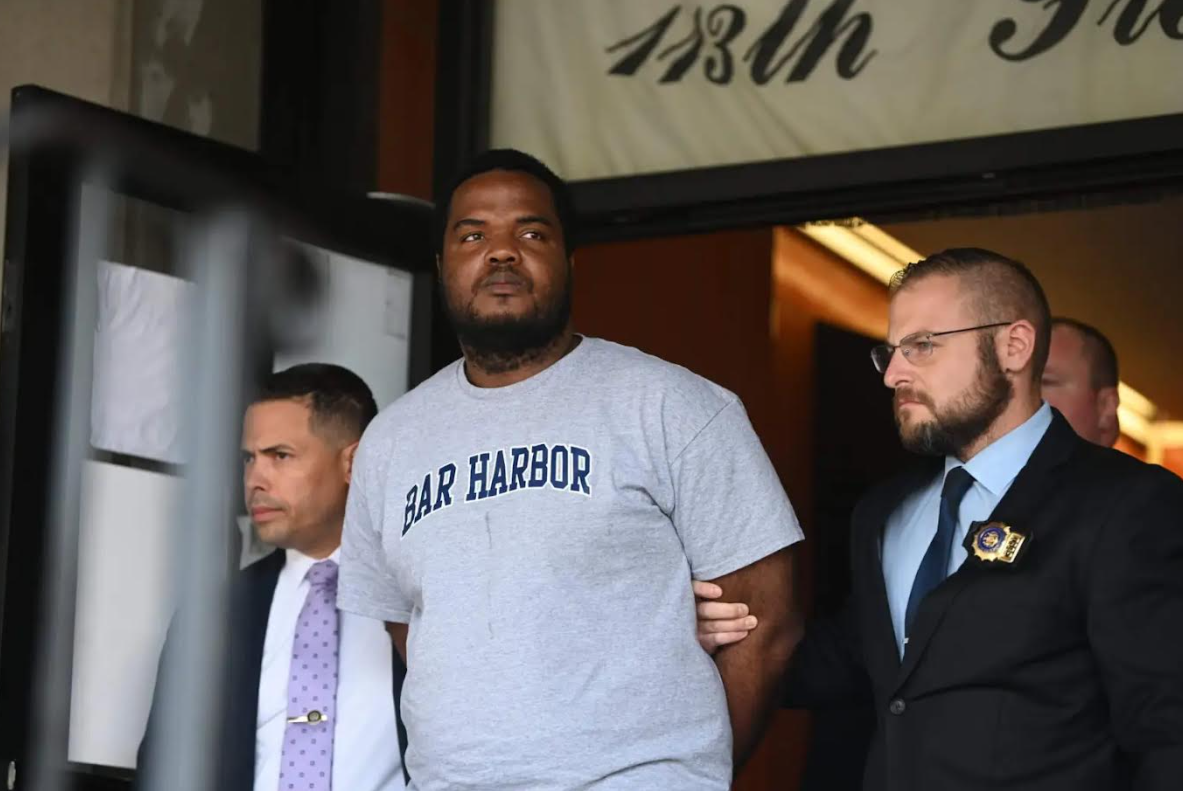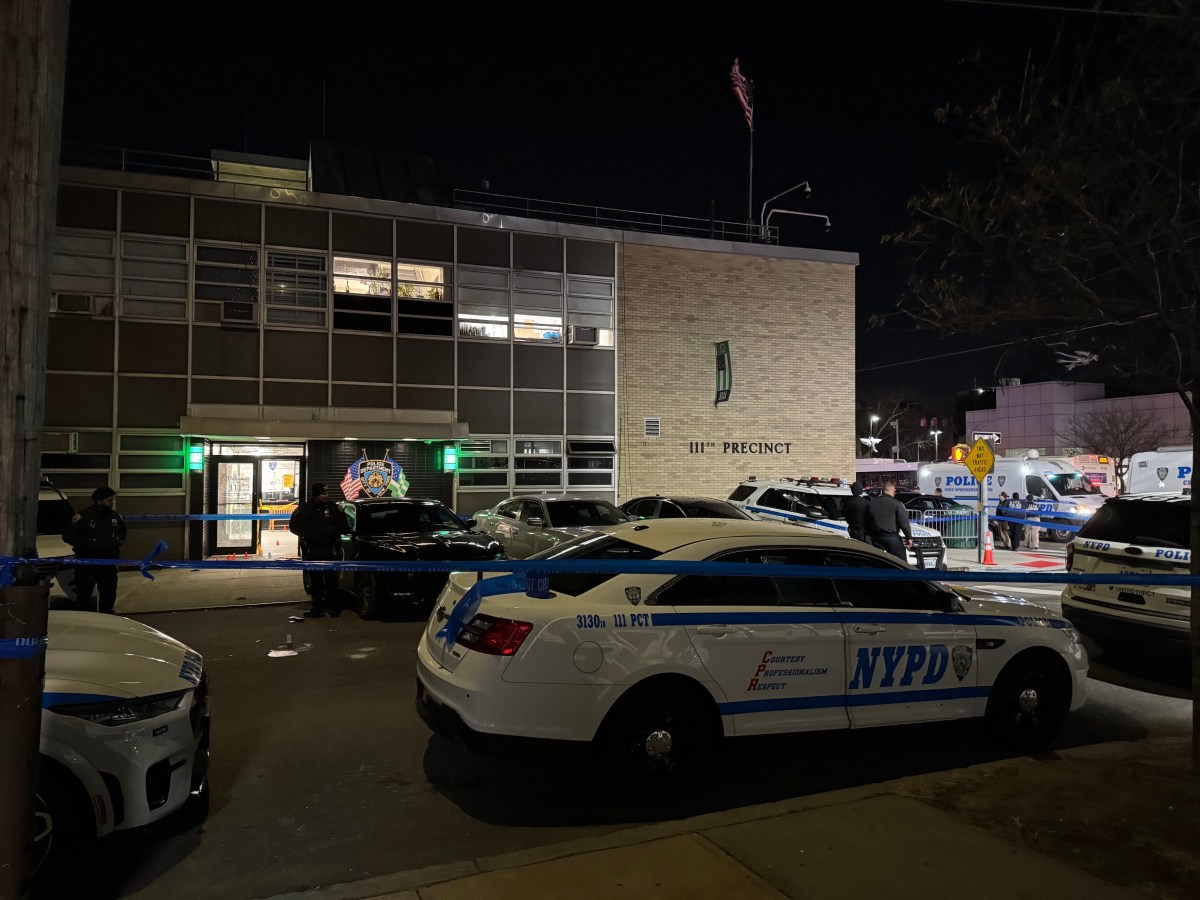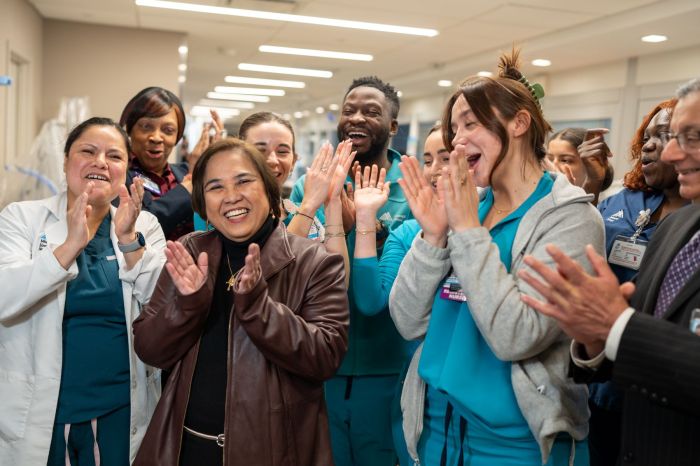Education advocates from youth and family services providers joined elected officials outside of Tweed Courthouse in Lower Manhattan on Monday to decry proposed education budget cuts.
The rally — organized by Good Shepard Services, one of New York City’s largest nonprofit youth and family services providers — was held ahead of the City Council’s executive budget hearing on education.
Advocates representing different organizations such as Fostering Youth Success Alliance, the Day Care Council of New York, Advocates for Children of New York, and the New York Immigration Coalition, called for greater investment in early childhood education, mandated services for students with disabilities, more support and services for schools with newly-arrived migrant youth, and faster and more reliable busing transportation for foster care students.
They were joined by the Council’s education chair Rita Joseph, Council Members Lincoln Restler (D-33), Julie Won (D-26) and Shahana Hanif (D-39), and a representative of Public Advocate Jumaane Williams.
Under the mayor’s proposed budget, the NYC Department of Education would get $37.5 billion for the 2024 fiscal year — roughly $1 billion below the current projection for fiscal year 2023. This equates to a budget of around $37,500 per student, according to the Citizens Budget Commission, a nonpartisan research organization.
In a response to a request for comment from amNewYork Metro about the proposed cuts, the DOE pointed to Chancellor David Banks’ announcement at the budget hearing that in spite of fiscal challenges, schools next year “will be held harmless for their initial budget allocations compared to this current year, so no school will get a lower initial allocation. While schools may see increases or decreases in specific allocations, like Title I or FSF (Fair Student Funding), we will ensure that all in, schools will be held flat or see an increase.”
The DOE highlighted several key budget initiatives including a $3.3 million investment for shelter-based coordinators, $5.5 million for the Wellness in Schools Food program and $2 million for the mayor’s Climate Action Plan. The DOE also pointed to $50 million for its Cafeteria Enhancement Experience, which amNewYork Metro recently filed a FOIL request to receive more details around the redesign of 80 school cafeterias. The FOIL request has not yet been returned.
Banks said that the education budget will be in place “no later than the end of this month.”
Systemic issues
Gregory Brender, director of public policy at the Day Care Council of New York, underlined the systemic issues that McClammy raised, including cuts to 3-K expansion.
“We have a system that is not paying childcare providers; people are waiting months, sometimes six months, sometimes a year, to get paid to provide childcare to the youngest New Yorkers,” Brender said at the rally. “We have people who are working who are not paid their salaries.”
Paullette Healey, a parent of two students with disabilities and the co-president for the citywide council in special education, discussed the loss of 18 teachers from one school in her district and the low ratio of occupational therapists to students at several elementary schools after Mayor Eric Adams had cut funding from schools last year.
Healey said the cuts directly impacted her children and their individualized education programs. She said that the city should be ensuring that all students with disabilities receive their special education mandated services and classes instead of cutting hundreds of millions of dollars from the DOE budget.
“My own son and 15 of his other classmates didn’t get speech therapy until January,” Healey said at the rally. “That is the living experience of what the effects the cuts of September had on our students with IEP.”
Joyce McClammy, from the Day Care Council Local 205 union, expressed frustration at the rally over the DOE’s invoice system for childcare providers.
“They tell us that we can’t put more than one invoice in,” McClammy said. “We’ve been waiting for November and December invoices from last year. It is ridiculous.”
Ruksana Ruhee, a youth researcher at Girls for Gender Equity and instructor at Sunnyside Community Services after-school program, said she is overworked in her after-school program, where she teaches 20 first graders. The Baruch student told amNewYork Metro that she is personally invested in education advocacy after being born and raised in New York City and seeing injustices in Black, brown, and immigrant communities.
“Especially where I live in Jackson Heights, you see a lot of low-income, undocumented immigrant communities that struggle to survive,” Ruhee said. “My family’s scrambling to make money. My mom and dad overwork themselves so hard because we can’t even afford where we live. My personal goal is to make sure that everyone is living sustainably and everybody has what they need.”
Ruhee said she believes the injustices stem from “a lot of institutional oppression” that restrict working-class families, like hers, from being able to afford basic necessities such as food and rent.
“I’m trying to fight for the mayor to not cut funding that is essential for families, because we keep the city going,” Ruhee said. “We’re the backbone of the city.”
Along with protesting against the proposed education budget cuts, Ruhee is advocating for higher funding for after-school teachers, and told amNewYork Metro that they “are very underpaid and very understaffed.” While there should be a rate of one instructor for every 10 children, there is roughly one for every 20 at her program.
“A lot of us are young college students; we have class, we also do multiple jobs,” Ruhee said. “We’re demanding at least $21 an hour.”
Liza Schwartzwald, the senior manager of economic justice and family empowerment at the New York Immigration Coalition, expressed her support for immigrant and newly-arrived migrant families, which she reiterated is not a new issue.
“For decades, immigrant students have been unable to enroll and even find quality programs,” Schwartzwald said. “But once a student steps foot in New York City and decides to stay here, they become one of our students and our job is to take care of them and get them what they need.”
Schwartzwald highlighted two initiatives that the coalition supports. One is the new English language learner transfer high school programs that she said provide students the support they need where they live and work, including trauma-informed care for the city’s newly-arrived migrant students.
Schwartzwald said the investments should also go towards the New York Immigration Coalition’s LIFE program, which support organizations in New York City conducting outreach and enrollment for immigrant families for early childhood programs.
“I don’t want to hear about under-enrollment until we talk about how we’re finding families, doing outreach and helping them through the complicated education system,” Schwartzwald said.
The deepest cuts
Randi Levine, policy director of Advocates for Children of New York, highlighted inequities that cuts to the education budget would deepen: access to expedited mental health care for students at dozens of high-need schools, funding for immigrant family communication and outreach, and funding for community schools that provide comprehensive, wraparound services.
Levine raised concerns around from the “Program to Eliminate the Gap” which would be save $305 million from a re-estimate of growth in the DOE’s fringe benefits budget.
“The city’s explanation has been that the amount allocated for fringe has been exceeding actual fringe expenses,” Levine told amNewYork Metro in an email. “However, we understand that the DOE has used the excess fringe benefits funding this year for other purposes ranging from early childhood education to leases.”
In a statement to amNewYork Metro, City Hall spokesperson Amaris Cockfield responded to the fringe benefits: “The savings accomplished in this budget did not impact services or result in layoffs, and we did not take a dime from our classrooms.” The savings will not impact employee benefits, programs and service delivery, or classroom funding.
Deidra Nesbeth, director of the Fostering Youth Success Alliance, applauded the recently-formed team within the Department of Education that focuses solely on serving students in foster care, calling it a “huge step in the right direction.” Nesbeth pointed to busing transportation as a high-need priority, especially because schools have the potential to provide students in foster care with some semblance of stability.
“It is crucial that the city invest the necessary funds to make sure every student has busing to and from school,” Nesbeth said at the rally. “This is transportation that needs to be in place timely. There are students who wait as much as six months for a bus route.”
Council Member Won, who represents western Queens, pointed to capacity issues at after-school programs in her district, which help pave a future for many students.
“We cannot cut pre-K or any sort of after-school programming,” Won said at the rally. “It is not okay that at my school we have to fight over free after-school programming because we could only take about 30 students per school.”
Council Member Restler, who represents north Brooklyn, decried how Adams and Schools Chancellor David Banks “pushed through a vote of a new school budget” for fiscal year 2024 through the DOE’s Panel for Educational Policy without any numbers. He said the lack of transparency is leaving room for doubt and worry.
“Now, they’re coming back for an executive budget hearing before the council without any numbers,” Restler said. “There is no oversight. There is no accountability. It is unacceptable. We don’t know what our school budgets look like next year. We don’t know if the mayor and the chancellor are trying to impose another round of unacceptable, devastating cuts because they won’t share the data.”
Restler said the soundest investment the city can make for its youth is early childhood education, but that Adams and Banks are not visibly putting forth the effort in outreach and engagement with immigrant and low-income families. The council member then doubled down on his resistance against the proposed budget cuts.
“What we do know is that this mayor and this chancellor are trying to destroy early childhood education,” Restler said. “We will not accept one penny of cuts to our schools in this budget.”
